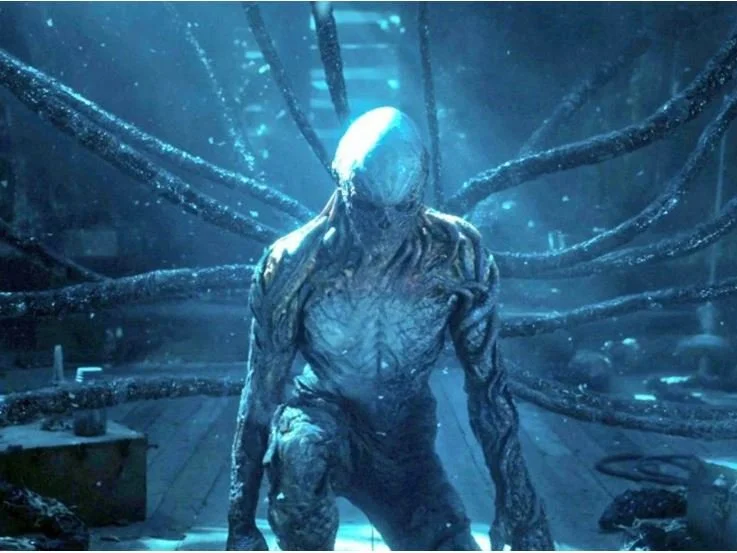Does Stranger Things Season 4 Help Us Understand Trauma Through Vecna?
Stranger Things Season 4, Volume 1—Vecna and Running Up That Hill of Trauma
Stranger Things season 4 wowed in quite a few ways, but to me, the mental health angle in the subtle commentary around post traumatic experiences and growth, stuck out the most.
Spoilers below for season 4 vol 1, so beware! (mostly relating to the villain and how he acts, no resolutions). I won’t be discussing Vecna’s background in detail since it appears there is more to touch upon in season 4 vol 2, so, maybe we’ll circle back on that after July. I’ll also be talking about trauma, post-traumatic growth and suicidal ideation, so please do take care for your needs if you find either of these topics uncomfortable at this time.
The set up
For now, here’s the set up since season 3. Eleven is living in LA with Joyce, Will, and Jonathan and not having an amazing time due to school bullies and lack of powers in the aftermath of the last season. Meanwhile, the teenagers of Hawkins are still being hunted in fresh ways by the hellish creations living in the Upside Down.
This time the victims start seeing hallucinations, followed by weird headaches, all accompanied by memories of trauma they’ve been trying to suppress. The hallucinations all end the same—a demon, who we learn is actually the lich, Vecna, summons them to the upside down, breaks their bodies, takes their eyes out, and then puts them on display in his hellscape. Pretty standard Stranger Things fare so far, if maybe a bit spookier than previous seasons.
Here's what’s particularly interesting about Vecna’s gruesome methods.
A list of his recent victims:
This is Vecna’s second hunt for victims in a few decades. As we zoom through the town in the Upside Down, catching snippets of conversations, we see that he stops on those who spend a lot of time thinking about their past.
His first victim in this round is Chrissy, who seemingly has a complicated, painful relationship with her (possibly deceased?) mom.
The second is Fred, who feels immense guilt after surviving a car accident his friend did not.
While the third attempted victim is part of our usual Hawkins gang. Max, who just last season witnessed her brother, Billy, get brutally harpooned through the heart as he sacrificed himself during the final mall battle.
There is one more victim, Patrick, who is suggested to have experienced abuse from his family, without much detail being given around the specifics (we don’t see his flashbacks as much as the others were shown before their murders).
Common criteria for Vecna’s targets:
1) All of them are running from intense, painful emotions such as grief, fear, shame, and guilt.
2) Vecna uses these emotions as a means to make them feel hopeless and give up on escaping their fate. He tells them that he is actually ending their suffering, forcing them to submit, before stealing their lifeforce and mangling their bodies.
Vecna is the most terrifying villain I can imagine in the Stranger Things universe, where the kids are living through perpetual traumatic experiences.
And I think it’s really cool that the Duffer brothers chose to explore this side of horror that’s usually overlooked. I mean, how many teenagers in classic horror (Friday the 13th, Halloween) movies go through repeated trauma without anyone noting it?
I would imagine for most people watching, it’s scary enough seeing a creature from Dungeons & Dragons lore that can show you flashes of your past and then you know, break all your bones and make your eyes pop out. For me, I’ve never had anything in the horror genre hit home quite the same way, because I could deeply relate to the all-encompassing feeling of reliving your past experiences, wanting to run away from them, only for them to quite literally be the reason for your demise. It’s one thing to feel like your past is haunting you. It’s another to know that it is actually the reason you might die.
Escape is possible
Music has been the only thing so far to help pull Vecna’s prey back to reality—out of the Upside Down, and back to safety into their own bodies. It’s unclear if the second volume of the season will explain in further detail why this is, or if we are to accept it as simply part of the lore.
It’s hugely significant that only Max was able to escape Vecna’s grasp successfully in volume 1 of season 4. Max, who at the time of the attack is surrounded by friends, her favorite song (bless Kate Bush) on a Walkman and has been pushing herself to be vulnerable. Prior to starting to see the telltale hallucinations, she was shown to be closed off to talking about how she felt over her brother’s death. As she gets more vulnerable and writes letters to say final goodbyes, she finds that she actually grows closer with her friends who have been trying to be there and help her all along. It’s also important to note that Vecna finds her as she is speaking to Billy at Billy’s grave, as she’s describing her guilt and pain and going through her memories.
But it is incredibly difficult
Our mind tells us that if we run away from pain, keep it all bottled up inside and tell no one, we can escape the haunting and shield our friends.
As someone who, for years, experienced heavy suicidality, major depressive disorder and post-traumatic stress (some of which was at first, undiagnosed), everything about Vecna’s attacks felt familiar. When you fall into a flashback, first you feel like you’re no longer within the dimension others are in. Reality melts away, and you are unequivocally in the past, living, breathing, and experiencing with every sense your previous trauma.
I re-lived my trauma until I learned through years of therapy that I couldn’t change my past. There was no way I could just change X and prevent Y. That the point was not to keep running but to accept certain aspects of my experience and deal with the accompanying emotions. This is a crucial pain that most of Vecna’s victims experience and have no way to resolve before it’s too late.
I’ve also learned that the best way out of those flashbacks for me was re-grounding in the moment. Re-grounding is our ability to became aware of where are and root ourselves in the present, usually through senses. Sometimes that takes help from others, sometimes that would take something breaking the “reality” of the moment (like when in a dream you realize some real-life logic is too broken for it to be real) on your own.
You can re-ground by grabbing onto an item you carry around with you, literally feeling the ground if you’ve fallen down or hearing music you associate with something outside of that memory. For me, it was anything that engaged my senses once again in the true world instead of whatever I was recalling. In the show, for Max, it was hearing the Kate Bush’s hit, Running Up That Hill.
As far as I know there was no Lich in my mind. But part of my flashbacks were people in my life who had said things like “the world would be better without me” or that I should “give up.”
For the characters in Stranger Things, Vecna works as that voice.
When I stayed too long within the flashback, I would usually become suicidal, as I felt there was no other way to stop this pattern and was desperate to not hate myself while I went through the traumatic events I was remembering. That’s why Vecna’s “I will end your suffering” was so real and chilling—It’s a sweet promise.
While I have not read at this time that anyone working on Stranger Things season 4 specifically meant for people to make this clear connection with what it’s like to live with trauma, it certainly connected for me.
Creating fictional work like this does such an incredible job offering nuanced representations of trauma without directly calling it out. And as a result, does a wonderful job to reduce stigma. So, if nothing else, I just wanted to make sure I thanked both Vecna and the Stranger Things team for giving us all space to think about it.
Mental health content reviewed by Elizabeth Kilmer, PhD
Photo by Lucca Anjali on Unsplash


